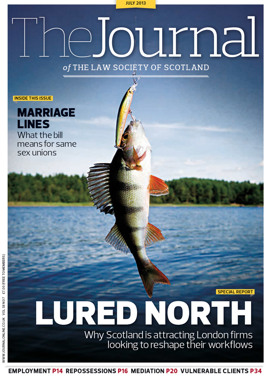Litigation: a tight ship?

Litigation remains the second highest cause of claims by practice area, a long way behind property/conveyancing in terms of both number and value of claims. Given the adverse economic environment of the past few years and the resulting increase in contentious work, an increase in intimations arising from litigation work might have been expected.
In fact, the number of intimations in 2011-12 was the lowest in the past five years. Given current business conditions, this is a notable achievement and a tribute to the effectiveness of the profession’s management of risk. However there remains scope for improvement in some key areas of risk.
As always, identifying scope for improvement starts with analysis of the claims experience in terms of frequency and severity – focusing on areas where there is higher frequency of intimations or where claims tend to be particularly costly.
Key areas of risk/causes of claim
Analysis of the claims experience shows that personal injuries work generates the highest frequency of intimations, followed by family work and then commercial and property-related litigation. Criminal court work generates very few claims, and has not resulted in any payment of damages in the past 10 years. By causes of claim, there are three principal contributors – missing critical dates, errors in the designation of the parties, and under-settlement.
Missing critical dates
Avoiding time bar claims is a theme addressed in many past Journal articles. It is a recurring focus of risk management discussion, partly because time bar continues to be the main cause of litigation-related intimations, and partly because this is widely regarded as the category of claims most readily prevented.
The e-learning module “Managing Critical Dates” on the Marsh website for Scottish solicitors addresses the risk management aspects of time bar claims and includes an assessment to test awareness. This free e-learning can be accessed at www.marsh.co.uk/scotlaw (see panel below).
Wrong party
Raising proceedings in the wrong name or against the wrong party is one of the recurring issues in the litigation claims experience, as is raising proceedings in the name of parties with no capacity/title to sue.
Some of these claims have proved to be costly, particularly where it is impossible because of prescription/limitation to raise proceedings afresh.
Under-settlement
The claims experience includes occasional instances of negligent errors and omissions resulting in under-settlement. Failure to include specific heads of claim can lead to the client receiving substantially less than they should have, had all heads of claim been included.
Aside from the risk of actual under-settlement, there is the potential for the perception of under-settlement on the part of the client disappointed at the level of a settlement agreed on his or her behalf. There may have been an element of wishful thinking, or unrealistic expectations, or wilful misunderstanding on the part of the client of the prospects of obtaining a certain level of compensation.
Client perceptions and expectations also need to be managed in terms of timescales in litigation. But delay is not necessarily just a matter of perception. Actual delay can be damaging too, even without missing a critical date.
Delay
Delay is likely to cause more complaints than claims, but the most common type of claim caused by delay arises from situations where as a result of inordinate and inexcusable delay on the part of the pursuer’s solicitor which has caused prejudice to the defender, the court has dismissed the action.
Fee disputes
The current Master Policy claims experience features more instances of solicitors having to raise proceedings against their clients for payment of fees, and being met with a counterclaim alleging some shortcoming on the part of the solicitor. In challenging economic conditions, are clients using this approach as a way of negotiating a reduction, or a waiver, of fees?
Whether or not there is any merit in a counterclaim, avoiding the situation is clearly preferable. If the firm can avoid being in a position of having to think about suing a client, there will be no risk of a counterclaim alleging negligence. In the current economic climate, part of the answer may be to maintain strict credit control procedures; ensure that credit checks are undertaken and that solicitors stay on top of work in progress; incorporate payment schedules; and bill clients on a regular basis.
If the firm is considering suing for payment of fees, perhaps an assessment ought to be made of the risks involved (including reputational risks) before deciding to proceed. Even the smallest of faults on a file can cause the basis of a counterclaim, and it may be sensible to have the particular file reviewed by the firm’s claims partner before raising proceedings.
External fraud
By reference to the claims experience of recent years, the exposure of Scottish solicitors to the adverse impact of external fraud and dishonesty has been largely confined to property/conveyancing work, typically resulting in claims by lenders. However, to date there have been no intimations arising out of external frauds and scams in litigation practice.
In other jurisdictions, litigation has not escaped the attentions of the determined and sophisticated fraudster. There have been instances of fake debt recovery engagements where the objective has been money laundering, and other cases where a fake cheque or bank draft is proffered in settlement, resulting in a fraud on the solicitors themselves, and their client account.
Safety measures
The majority of Litigation-related intimations result from human error or administrative oversight, rather than getting the law wrong. There is no evidence of claims arising as a result of solicitors dabbling in areas of law and practice with which they are unfamiliar. One of the mantras of risk management is that most claims are avoidable, and that is equally true with Litigation-related claims.
While keeping up to date with the law, practice and court procedure rules is clearly essential in all areas of practice, analysis of the claims experience suggests that frequency of the principal causes of claim could be further reduced by practical risk management measures and disciplines:
- identifying the time bar date, including unusual situations and time limits;
- having a colleague verify your conclusion regarding critical date;
- consistent use of a diary/reminder system which generates countdown prompts and warnings to enable the appropriate action to be taken timeously;
- verifying the correct name/designation of the pursuer/defender;
- ensuring the client is clear with regard to costs and billing arrangements, and ensuring good credit control;
- implementing a case/file review process with a view to preventing avoidable delay;
- ensuring that clients are kept informed of developments or the reasons for unavoidable delay;
- maintaining awareness of external frauds and scams.
Breaking down the figures
The Annual Master Policy Report produced by Marsh contains facts and figures on the breakdown of claims for litigation and other practice areas.
For further information on the Master Policy claims experience, Marsh’s 2013 Annual Report can be found at www.marsh.co.uk/scotlaw.
All practices have been given a username and password to access the website. If you have forgotten your login details, these can be obtained by emailing Nada Jardaneh at nada.jardaneh@marsh.com
Nada Jardaneh and Marsh
Nada Jardaneh is a former solicitor in private practice, who works in the Finpro (Financial and Professional Risks) National Practice at Marsh, a global leader in insurance broking and risk management.
The information contained in this article provides only a general overview of subjects covered, is not intended to be taken as advice regarding any individual situation and should not be relied upon as such. Insureds should consult their insurance and legal advisers regarding specific coverage issues.
Marsh Ltd is authorised and regulated by the Financial Conduct Authority for insurance mediation activities only.
In this issue
- Credit hire: back to basics
- You know who I mean
- Behind all the fun
- Your Future in Law
- Reading for pleasure
- Opinion column: Cameron Fyfe
- Book reviews
- Profile
- President's column
- Mapping out the Crofting Register
- Back office bait
- Another bite at the cherry
- Security of your home
- Marriage redefined
- Building better business cultures
- Keeping a rein on child cases
- Minimum gain
- Beware LLP tax changes
- Framework remodelled
- Scottish Solicitors' Discipline Tribunal
- A Scottish ILG chair in New York
- Beneath the surface
- Being alert to the needs of the vulnerable
- Sins of our leaders
- How not to win business: a guide for professionals
- Litigation: a tight ship?
- Ask Ash
- Why sep rep?
- From the Brussels office
- Law reform roundup
- Diary of an innocent in-houser






